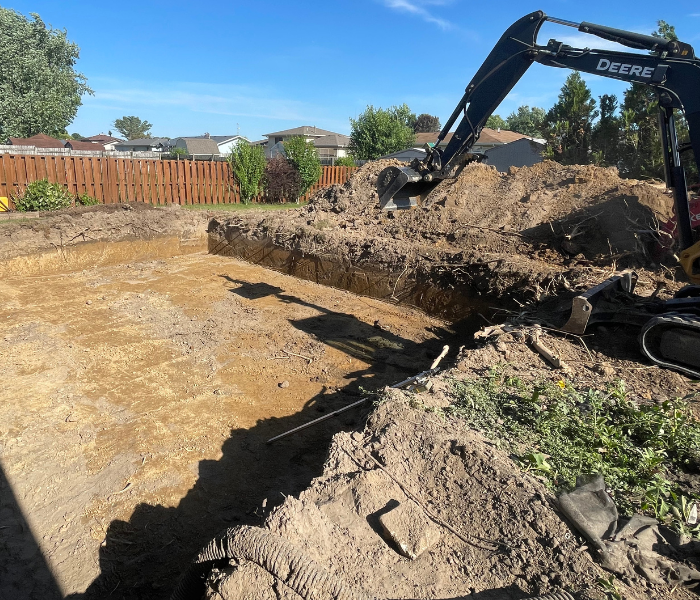Residential Excavating Ohio - Specialized Excavation for Ohio Residences
Residential Excavating Ohio - Specialized Excavation for Ohio Residences
Blog Article
Comprehensive Excavation Approaches: Understanding the Fundamentals for Success
The cautious planning, specific execution, and meticulous focus to information called for in excavation jobs demand an extensive method that encompasses numerous fundamental facets. The true proficiency lies not just in comprehending these principles however in perfectly incorporating them to navigate the complexities of excavation tasks with skill.
Understanding Excavation Task Preparation

The initial stage of any kind of excavation project is the planning phase, where essential decisions are made that can significantly affect the outcome of the job. Recognizing the project spending plan, scope, and timeline constraints is important for producing a detailed excavation strategy that ensures the job's success.
One key aspect of excavation project planning is the advancement of a thorough timeline that details the series of activities, turning points, and target dates. This timeline acts as a roadmap for the task team, allowing them to track progression and make essential modifications to guarantee the project remains on timetable. Furthermore, a well-defined spending plan that makes up all costs, including equipment service, labor prices, and materials, is important for staying clear of expense overruns and delays. By carefully thinking about all these factors throughout the planning phase, excavation jobs can be performed successfully and effectively, bring about successful end results.
Dirt Analysis and Website Examination
Performing extensive dirt evaluation and site assessment is a crucial action in the prep work stage of any kind of excavation project. Soil evaluation involves identifying the structure, framework, and residential or commercial properties of the dirt at the excavation website. This information is important for understanding the soil's bearing ability, moisture content, and capacity for erosion, which are essential elements in establishing the excavation methods and tools needed for the task.
Website assessment surpasses soil analysis and incorporates a broader evaluation of the overall website problems. This assessment includes identifying any type of prospective dangers, such as below ground energies, ecological worries, or unstable terrain, that can impact the excavation process. By completely evaluating the site, task supervisors can establish efficient excavation techniques that prioritize safety and security, performance, and ecological defense.
Utilizing innovative modern technologies like ground-penetrating radar, dirt sampling, and drone surveys can boost the precision and effectiveness of dirt analysis and site assessment. Investing time and sources in these preliminary steps can inevitably conserve time and avoid costly hold-ups or difficulties throughout the excavation process.
Equipment Choice and Utilization
Effective excavation projects count heavily on strategic tools selection and application to make sure optimal efficiency and performance. Picking the appropriate equipment for the task is important in making the most of performance and reducing downtime. Factors such as the kind of soil, deepness of excavation, and job scope play a substantial role in identifying one of the most appropriate devices for the job handy.

Along with choosing the appropriate equipment, appropriate utilization is essential to project success. Operators needs to be trained to manage the tools safely and successfully - excavating ohio. Normal maintenance checks and prompt repairs aid protect against break downs and guarantee regular performance throughout the job
Safety Actions and Rules Conformity
In the realm of excavation tasks, prioritizing precaution and conformity with laws is paramount to guaranteeing a safe and secure and legally audio functional environment. Precaution incorporate a series of methods, including performing comprehensive website evaluations, implementing proper signs and barriers, and supplying sufficient safety training for all personnel associated with the excavation procedure. Adherence to guidelines, such as OSHA requirements in the United States, makes sure that the excavation project fulfills the needed standards to secure workers, onlookers, and the surrounding atmosphere.

Tracking Progress and Adjusting Techniques
Just how can forecast managers effectively track the advancement of excavation projects and adapt their approaches appropriately to optimize results? Monitoring development is important for guaranteeing that excavation projects remain on track and meet due dates. Job supervisors can make use of various devices and methods to track progress, such as day-to-day progression reports, regular website examinations, and progressed monitoring innovations like drones and GPS tracking systems. By continually keeping track of the task's development, supervisors can determine any potential hold-ups or concerns early and take positive actions to address them.

Verdict
Finally, grasping the fundamentals of thorough excavation strategies is necessary for the success check my blog of any type of task. By recognizing project preparation, examining soil and website conditions, picking suitable tools, following safety guidelines, and monitoring development, task managers can make certain a smooth and effective excavation process. Applying these techniques will certainly result in effective outcomes and lessen potential dangers or setbacks during the excavation job.
The initial phase of any kind of excavation project is the planning phase, where crucial choices are made that can significantly affect the end result of the project. Comprehending the job budget, extent, and timeline restrictions is important for developing a comprehensive excavation strategy that ensures the task's success.
Exactly how can project managers successfully track the improvement of excavation tasks and adapt their techniques appropriately to maximize outcomes? By carefully monitoring development and being willing to adapt approaches, project managers can improve the general success of excavation jobs.
By recognizing task preparation, assessing dirt and website problems, picking ideal tools, conforming with safety laws, and keeping track of development, job managers can ensure a efficient and smooth excavation procedure.
Report this page